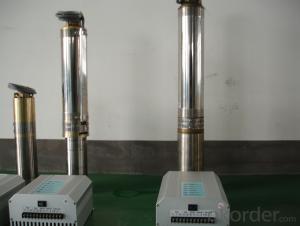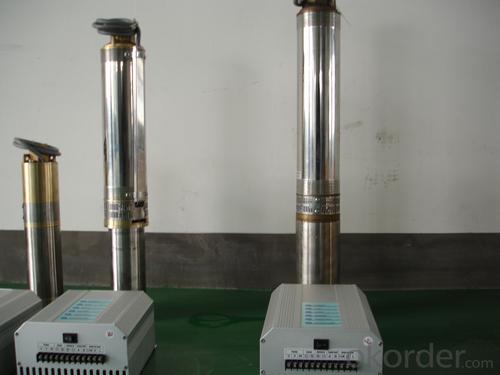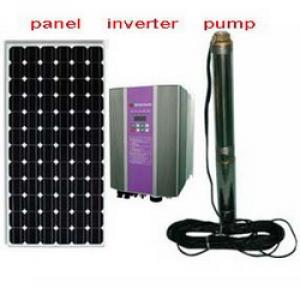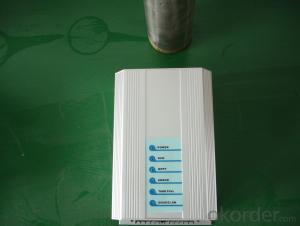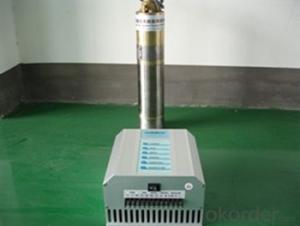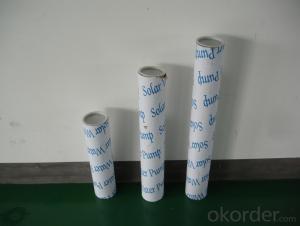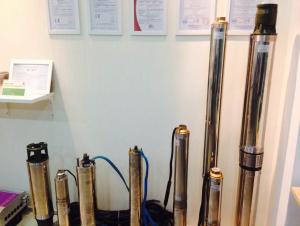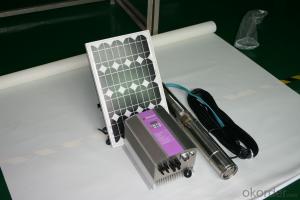DC Solar Water Pump
- Loading Port:
- China Main Port
- Payment Terms:
- TT OR LC
- Min Order Qty:
- -
- Supply Capability:
- -
OKorder Service Pledge
OKorder Financial Service
You Might Also Like
Item Description :
This superb new addition to our solar fountain range comes with a 10w solar panel,and a powerful fountain pump that is capable of producing fountains of up to 2m in height. As well as being easy to set up and use.Instruction manual is supplied for assembly and maintenance.
Solar Fountain Key Features :
Powered by direct sunlight
No high voltage electric mains required
Safe for children
Max. height of fountain: 2M
Max. flow capacity: 800 L/H(176 GAL)
10W Polycrystalline solar panel included
18V DC brushless pump
Solar Pump Features :
Can produce fountains up to : 2M (tube height) 1.4M (fountain height)
Comes with multiple nozzle accessories
Cable Length : 5M
Solar Panel Features :
10W peak power.
Polycrystalline highly efficient solar panel
Comes mounted in aluminium frame
Comes with ground stake and rotating knob so you can angle your panel toward the sun
What You Will Get :
10W solar panel
Solar pump
Ground Sake
Nozzle accessories
Precautions :
DO NOT alter or change the product itself or its components
Operate pump in freshwater only, never above 50 degrees celsius
Keep away from flammable liquids
Do not connect to any other power supply other than the included
- Q: Can a solar pump be used for irrigation in vineyards?
- Yes, a solar pump can be used for irrigation in vineyards. Solar pumps are a sustainable and cost-effective solution for delivering water to vineyards, as they use solar energy to power the pump instead of relying on traditional electricity sources. Solar pumps are particularly beneficial for vineyards located in remote areas or regions with limited access to grid electricity. They can provide a consistent and reliable water supply for irrigation, helping to maintain the health and productivity of the vineyard. Additionally, solar pumps have low maintenance requirements and can be easily installed, making them a practical choice for vineyard owners looking to reduce their environmental impact and operating costs.
- Q: Can a solar pump be used in areas with high levels of heavy metals in the water?
- Yes, a solar pump can be used in areas with high levels of heavy metals in the water. Solar pumps are primarily used to extract water from various sources, and they do not have any direct effect on the quality of the water. However, it is important to note that the heavy metal contamination in the water may still pose health risks, and appropriate water treatment methods should be employed to make the water safe for consumption or use.
- Q: Can a solar pump be used for wastewater recycling?
- Yes, a solar pump can be used for wastewater recycling. Solar pumps are an environmentally friendly and cost-effective solution for pumping water, including wastewater, using solar energy. By utilizing solar power, these pumps can help in the process of recycling wastewater for various purposes such as irrigation, industrial uses, or even for non-potable water needs.
- Q: Is a solar pump suitable for all types of water sources?
- No, a solar pump may not be suitable for all types of water sources. Its effectiveness can vary depending on factors such as the depth of the water source, the availability of sunlight, and the quality of the water. It is important to assess the specific requirements of the water source before determining if a solar pump is suitable.
- Q: Can a solar pump be used for water supply in remote mining sites?
- Yes, a solar pump can be used for water supply in remote mining sites. Solar pumps are powered by energy from the sun, making them a sustainable and cost-effective option for remote locations without access to electricity. They can efficiently extract and distribute water for various mining operations, ensuring a reliable water supply for workers, equipment, and other needs.
- Q: How does the performance of a solar pump vary with different solar panel orientations?
- The performance of a solar pump can vary with different solar panel orientations due to several factors. Firstly, the orientation of the solar panels determines the amount of sunlight they receive throughout the day. Solar panels are most efficient when they are directly facing the sun, allowing them to capture the maximum amount of solar energy. Therefore, panels that are perfectly aligned with the sun's path will generate the highest amount of electricity, resulting in optimal performance for the solar pump. Secondly, the tilt angle of the solar panels also plays a crucial role in their performance. The tilt angle determines how well the panels can capture the sunlight at different times of the day and throughout the year. A tilt angle that matches the latitude of the installation location is generally considered optimal, as it allows for maximum exposure to the sun's rays. Furthermore, the direction in which the solar panels are facing can impact their performance. In the northern hemisphere, solar panels facing south tend to generate the highest amount of electricity, while in the southern hemisphere, panels facing north are typically more efficient. This is because the panels are oriented towards the sun's path and can capture sunlight for longer periods during the day. It is important to note that the performance of a solar pump is directly dependent on the electricity generated by the solar panels. Any variation in solar panel orientation can affect the amount of energy produced, which in turn affects the operational efficiency of the pump. Therefore, choosing the optimal solar panel orientation is crucial for maximizing the performance of a solar pump and ensuring its reliable operation.
- Q: How does a solar pump handle water source contamination from sewage leaks?
- A solar pump does not have the capability to handle water source contamination from sewage leaks. It is primarily designed to extract and pump water from a source, but it does not possess any specific mechanisms to treat or purify contaminated water. In case of sewage leaks or water source contamination, it is essential to address the issue at its root cause and employ appropriate water treatment methods before using a solar pump or any other water extraction system.
- Q: Can a solar pump be used for water supply in residential communities or housing complexes?
- Yes, a solar pump can definitely be used for water supply in residential communities or housing complexes. Solar pumps are an excellent alternative to traditional electric pumps as they are powered by solar energy, which is clean, renewable, and abundant. These pumps use photovoltaic panels to convert sunlight into electricity, which in turn powers the pump to draw water from a source such as a well, borehole, or reservoir and distribute it to the desired location. There are several advantages of using a solar pump for water supply in residential communities or housing complexes. Firstly, solar pumps are cost-effective in the long run as they do not require any fuel or electricity to operate, resulting in reduced energy bills. Additionally, solar pumps have low maintenance requirements, leading to further cost savings. Furthermore, solar pumps are environmentally friendly as they do not produce any greenhouse gas emissions or contribute to air pollution. They also help conserve water as they can be equipped with sensors and controllers to optimize water usage and prevent wastage. Solar pumps are reliable and efficient, capable of operating even in remote areas with limited access to the electrical grid. They can provide a consistent and uninterrupted water supply throughout the day, ensuring the needs of the residential community or housing complex are met adequately. In conclusion, solar pumps are an excellent choice for water supply in residential communities or housing complexes. They offer numerous benefits such as cost savings, environmental sustainability, and reliable operation. With their ability to harness the power of the sun, solar pumps provide a sustainable and efficient solution for meeting the water demands of residential areas.
- Q: Can a solar pump be used for residential water supply?
- Residential water supply can indeed utilize a solar pump. In areas with inconsistent or absent electricity supply, solar pumps offer a sustainable and economical solution for homeowners. By harnessing solar energy, these pumps operate without relying on conventional electricity sources. They effectively draw water from wells, boreholes, or other water sources, and can distribute it to different areas of a residential property, including gardens, toilets, and even for drinking purposes. The adoption of solar pumps not only decreases electricity expenses but also aids in the reduction of carbon emissions, thus presenting an eco-friendly alternative for residential water supply.
- Q: Can solar pumps work at night or on cloudy days?
- No, solar pumps cannot work at night or on cloudy days as they rely on sunlight to generate electricity.
Send your message to us
DC Solar Water Pump
- Loading Port:
- China Main Port
- Payment Terms:
- TT OR LC
- Min Order Qty:
- -
- Supply Capability:
- -
OKorder Service Pledge
OKorder Financial Service
Similar products
Hot products
Hot Searches
Related keywords
